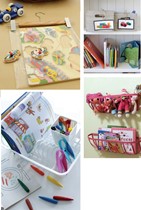How to rock your relationship - after baby arrives

As the somewhat antiquated rhyme goes: "First comes love, then comes marriage, then comes the baby in a baby carriage." What they neglect to tell you is that after that comes at least a few months of sleep and sexless nights, nagging remarks, and occasional bouts of resentment. But it's universally agreed that in order to raise happy children, you have to nurture happy parents. Ensuring your children have the best possible start in life isn't about taking folic acid and practising your labour breathing techniques - it's about entering parenthood with your eyes wide open and with a commitment from both you and your partner to do this as a team.
Anna is a new mum who was with her partner for two years before their baby arrived. She says that before baby, "We did pretty much everything together, he was the love of my life basically, but having a baby, even a completely planned baby, has turned our relationship inside out." In that first year of parenthood, Anna's husband had pressures at work, she suffered postnatal depression, the baby had reflux, and they had to move house.
"I feel like, somewhere in all the stress and tension and busy life of having a baby, we lost sight of us as a couple."
It's because of women like Anna that Auckland mum of three Natalie Cutler-Welsh decided to co-write a book with friend Jacqui Lockington. If Only They Told Me - The Real Deal On Parenting And Relationships In The Early Years is due out later this year. Natalie says when a friend's husband walked out on his wife, everyone was blown away - particularly the wife. But Natalie says when she looked at her own life with a five month old who wasn't napping properly and a husband away on business trips a lot with a female colleague, she "could totally see how that could happen".
Natalie wants people to know it's normal to have difficulties when you have babies, but that doesn't mean you're heading for divorce.
Satistics New Zealand doesn't collect figures for the number of couples who divorce within the first two years of becoming parents. But its figures show, that out of the 8874 divorces in New Zealand in 2010, 2204 involved children under the age of nine. That's a total of 3182 children under nine whose parents divorced.
Role play
The day your baby is born, your identity changes. From that moment you are now someone's mother, and your partner is someone's father. Together you will be redefining the roles you see yourselves and each other in. The reality is dads see their partners at the worst times of the day. First thing in the morning when you've had a crappy night's sleep, and at the end of the day that's often called "the witching hour". Natalie says it's like this: "He walks in the door at 6pm, you're struggling to get the kids' fed and bathed, and you think, 'You should have seen me an hour ago! I was dancing around the lounge with the kids to ABBA. I was awesome!'"
For many women the transition from successful working woman to stay-at-home mum is difficult. And when you're tired the little quirks that drive you a bit nuts grow in monumental proportion so you feel like bursting into tears when you walk into the bathroom and see he's "left that bloody towel on the floor again!"
The other thing we modern women tend to do is, well, everything. We're simply not good at sharing the load and would rather have things done our way, or not at all.
Yes, being a mother is hard work, but you have to admit, we do bring a lot of the angst on ourselves. In the movie Date Night, there's a scene where Steve Carrell's character Phil Foster pleads with wife Claire (Tina Fey). He says: "You've got me screwing up before I even have a chance to come through for you and maybe occasionally I might make a sandwich for Holly that, God forbid, breaches the jelly perimeter. But if you let me do something for you I think I would surprise you."
So go on, let go of the martyr complex. Natalie encourages all new mums in the first couple of weeks to leave the house and let their husband look after baby for at least an hour by themselves.
He may do things differently, but that doesn't mean it's wrong. Repeat after me: "Just let it go."
Nap or nookie?
There is one thing you don't want to let go however, and that's sex. When you've spent the day being pooped and puked on, getting your groove on is the last thing on your mind. Still, in order to give your children the gift of happy parents, you need to be connected and that involves intimacy which means sex.
Ian Kerner is a New York sex and relationship counsellor and best-selling author of the cleverly titled Love In The Time of Colic: A New Parents' Guide To Getting It On Again. The key word there is "again", because, while it may seem like a lifetime ago, you need to remember that the baby that's now the cause of such a lack of action in the bedroom was at some point conceived in a moment of romance. You need to remind yourself why you wanted a baby with your partner in the first place.
I laughed out loud at Ian's description of what Oprah would call his "light bulb" moment. He writes: "One time my wife, Lisa, was reading the Dr Seuss classic Hop On Pop to our toddler, Owen, and I found myself thinking, 'Hey baby, why don't you come over here and hop on this pop?' Let me tell you: when even Dr Seuss makes you think of sex, that's when things have to change."
Here's another question Ian says you should ask yourself to see if things need to change: "Would you rather do the dishes than your partner?" If the answer's yes, then read on girlfriend, it's time for action.
Stop the drought
Ian says he sees many couples going through a self-imposed sex drought. If they haven't already, things generally dry up around the third trimester of pregnancy, then there's about eight weeks after baby's born when the bed becomes a designated sleep-only zone. After that, Ian says, "It can be really challenging for a lot of couples to get their groove back."
Ian's co-author Heidi Raykeil writes of what is common among many new mums who've experienced those few months without sex, "I missed wanting sex, but I didn't actually miss having sex, I felt fine without it." There's nothing wrong with that per se, but feeling resigned about a lack of interest in sex can become habit-forming, and in turn will lead to a disconnection of closeness and intimacy with your partner. When that happens you'll find yourselves living more as flatmates than lovers.
The physicality of being pregnant and giving birth force huge changes on our bodies. Many women struggle with weight gain and feeling attractive after having a baby. But Ian Kerner says the truth is men still find their partners extremely sexy and they don't understand why women don't get that. Again, the key is communication. We need to let our men know what to do to make us feel sexy again, and if there are areas - yes, like the breasts that feel more like milk jugs - that suddenly feel like baby's property rather than zones of eroticism then tell him it's hands off, for now anyway.
Ian says he always encourages the men he sees to stick with it, and not take rejection personally. He says men need to keep gently trying to reinitiate romance with their partner, just as women need to realise that this isn't about the man "getting it on". What they're looking for as well as physical pleasure, is the feeling of connectedness and intimacy with you, their lover.
Back in the saddle again
If we can steal a word of advice from Nike: "Just Do It!" As Ian Kerner says, "sex ruts beget sex ruts, just as sex begets sex. People with a healthy sex life are the ones who have it regularly."
Heidi, rather controversially, even suggests charity sex. She says sometimes there's a place for just putting yourself through the motions and doing it, because once your body starts, your mind will kick in and the feelings will start to return. Yes, it may feel like a chore to start with, but Ian says, "The ironic thing is that new parents are often too tired to have sex, but actually when you have a good sex life you're more rejuvenated and energised than ever."
He says infidelity happens so much more with couples who have children under the age of five because having children can be such a trauma on the relationship. You'll get stuck in a sex rut, you'll feel like your whole relationship revolves around the baby, your partner may be throwing himself into work and you'll become detached from one another. If any of that is feeling a little too close to home then it's important to realise that it's quite normal, but it's also potentially dangerous. Your relationship is at a vulnerable time and you may need to regroup and reconnect.
Talk, talk and talk some more
Anna's advice is to keep reminding yourself why you wanted a baby with your partner in the first place, and to talk, talk and talk. She says she's learnt also to accept the different way her partner deals with an issue: "I can be quite confrontational, wanting to sort out a problem or argument right on the spot, whereas my husband likes to go away and think about it first and if you push him to talk before he's ready he will shut down and refuse to talk at all."
It's important you steal the moments of togetherness when you can. Don't get tired and stressed and vent your frustrations on Facebook. Instead, prioritise communication with your spouse. Also, rethink the playing field. Spontaneity is nice but let's be realistic. With baby taking up so much of your focus and time, it may be easier to schedule in romance. It's not so much about diarising your sexual encounters, as it is about creating a way for you to have quality time together. If date nights are too hard, aim for a day date. It can be much easier to leave your baby with Grandma for a couple of hours in the middle of the day and sneak off for a lunch date, than it is to put the pressure on yourself to have baby settled, milk expressed and fancy dress on for a night out on the town.
When Anna asked for advice from other mums almost unanimously their advice was to stick with it - things would get better. And they have, Anna says the troubles in the first year of parenthood have "made our relationship so much stronger because we have learnt to stand up for each other, to be there for each other and to communicate better with each other".
Love languages
Here are some of Natalie's tricks of the trade, some homework if you like, for you and your significant other to do, separately and together.
For the girls: How many times a day do you tell your children that you love them and that they're wonderful? How many times to you tell your husband? Once a month? Once a week if he's lucky?
When your man gets home from work do you bother to move away from the kitchen bench and embrace him? Try giving a little of the love you give your baby to your partner. Listen to him and really look him in the eye.
Send him a sexy little text during the day. He'll be as keen as mustard to get home and help get the kids in bed nice and early.
Tell him what you feel and what you need from him rather than getting in a sulk and hoping he'll work it out for himself. You really expect him to willingly open that can of worms? As if!
Wear clothes that make you feel good - if you walk around the house looking crappy you'll feel crappy. Why is it that we spend a great deal of time and money putting our kids in the cutest outfits, but too often neglect do so for ourselves?
When was the last time your husband had some time alone in the house? No doubt he'd really appreciate it if you took the kids away for an hour or two so he can have some time alone and in peace.
For the guys: Ask her "What can I do to help?" Not, "Do you need help?" because that implies she's not handling things. She'll be sitting down to feed and may look like she's got her feet up relaxing, but really she's thinking about all the chores she would be doing if she wasn't stuck in the chair. So, the first thing you should do is bring her a glass of water and a snack, then go and get the washing in. Thanks, love!
If you're hoping for some "business time" in the bedroom, try dishing out a spontaneous hug during the day. Don't wait until bedtime.
Early on, begin a discussion about what will be your dedicated jobs. Offer to take the baby out for a walk or a trip to the playground every Saturday morning so your wife can have a sleep-in. She'll look forward to Saturday morning like you look forward to a cold beer on a summer's day.
Together: "SMS" nights: One night it's sex, the next it's a massage, the next it's sleep. This is expectation management - if you know what to expect you'll focus and enjoy.
The "I love..." list: List all the things your partner loves. For instance, "You love playing golf, you love tinkering in the shed like your Dad used to do, you love olives and sundried tomatoes..." Do this together and you'll realise how well you really know each other and be reminded why you fell in love in the first place.
Rating scale: When hubby walks in the door, you can use short-hand to ask about each other's day. "How was your day, love?"
"It was a two."
"Oh, tough day, you can tell me all about it once the kids are in bed."
That way you're acknowledging what state of mind he's in, but agreeing to address it together once your family duties are done.
Give each other at least two compliments a day. They're easy and they're free. "That jersey looks nice on you" or "Thanks for dinner honey, that was delicious."
See, don't you feel better already?
Rochelle Gillespie is a mother of three. She enjoyed a recent night in with her husband, watching Date Night on DVD. It went well, but she admits that may have been in part due to Mark Wahlberg and his reluctance to put on a shirt.

AS FEATURED IN ISSUE 17 OF OHbaby! MAGAZINE. CHECK OUT OTHER ARTICLES IN THIS ISSUE BELOW

















